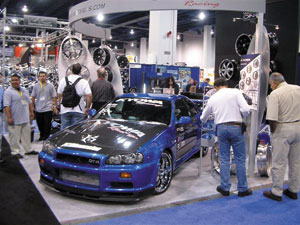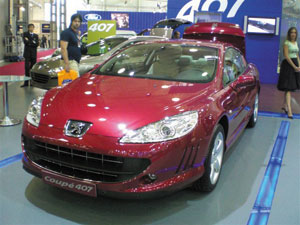Auto Industrial Policy Updates
2009/10/08 | By Michelle HsuChina's Ministry of Industry and Information and National Development and Reform Commission jointly announced on Aug. 28 that China would cut tariffs on auto parts which have been subject to a 25% import duty since April 1, 2005. Upon the August announcement, their import duty is cut to 10% as that imposed on other auto parts.
China used to levy import duty of 10% on all auto parts. But to curb import of knockdown cars (of which 65% of the parts is imported as auto parts and then assembled into whole vehicles to evade high duties levied on whole cars), China raised the import duty on such auto parts as high as 25%, to counter such evasive tactic, as that for whole cars.
China has announced lowering import duties to levels equaling those on commonly imported auto parts, reportedly in reaction to protests from the U.S. and Europe.
ASEAN-China Free Trade Agreement to Become Effective in 2010
The free trade agreement inked by the Association of Southeast Asian Nations (ASEAN) and China in 2005 will become effective in 2010, when most goods traded among the ASEAN founding members and China will be exempt of duty applicable to auto parts, chemicals, with duties on other items to be cut to their lowest ever.
The free trade agreement will be first applied to the six ASEAN founding members (Indonesia, Malaysia, Singapore, Thailand, the Philippines, and Bernie) in 2010, and will become applicable to the other four members (Vietnam, Lao, Burma, and Cambodia) in 2015.
The agreement will see the import duties on auto parts shipped from the six ASEAN founding members to China cut 4.31% in 2010, compared to the 7.04% of this year, 11.42% in 2007, or 13.59% in 2005. Such agreement will work against non-ASEAN countries as Taiwan, which still pays a high import duty of 14.92% for auto parts shipped to China.
Auto parts accounted for 5.4%, or US$505 million, of Taiwan's export to China in 2007.

The Anfavea, a national association of automakers in Brazil, reported encouraging news that the country's monthly auto sales soared to a record high of 300,204 units in June, marking a phenomenal growth of 16.8% from the previous month or 17.6% that of last year. Meanwhile, the single daily sales on June 30 also hit a record high of 24,151 units.
The booming auto sales are mainly attributable to the tax cut that the Brazilian government first announced last winter to help the manufacturing industry weather the global financial crisis. The tax cut has since been extended twice during the first half of this year, but the Brazilian government said that it wouldn't repeat such cuts and would gradually return the tax rate to the original level by the end of 2009.
The tax cut has successfully revitalized the ailing automobile market. The car sales volume this year was previously expected to drop 3.9% from last year's 2.82 million units, instead the annual auto sales this year may reach a new high.
Such cuts, however, have slashed tax revenues by around US$900 million in the first five months, and may further cause tax revenue loss of another US$720 million for the balance of the year.
EU to Levy Anti-dumping Duty on China-made Electric Bikes and Aluminum Wheels
While the anti-dumping duty that the European Union (EU) imposed on China-made bicycles and bicycle parts will expire in 2010, the EU is considering to levy other anti-dumping duties on China-made electric bikes and aluminum wheels.
Such plans have aroused concerns of affected manufacturers which have been expanding production lines in China to tap the global electric bike boom and rising auto parts industry there.
The EU's attempt to levy anti-dumping duty on China-made electric bikes is designed to protect makers in Europe and other areas. Taiwan's Giant, a major electric bike manufacturer in China, however is not expected to be significantly impacted since it has been focused on the high-end niche. The anti-dumping policy is aimed at makers mainly appealing to budget-conscious consumers.
The anti-dumping duty, proposed at up to 33% on China-made aluminum wheels and frames, would be effective for five years. The China Association of Automobile Manufacturers (CAAM) estimated that it would directly impact at least 46 companies of nearly 300,000 workers when it takes effect.
France Seen Moving Towards Protecting National Auto Industry
While Renault announced earlier this year that it would relocate its Slovenia production line in East Europe back to France-creating around 400 jobs at home accordingly-such move is seen to support official protectionist policies.
In February, Sarkozy announced that the government would offer 7.8 billion euros as low-interest loans to automakers on condition that the automakers will not lay off local workers, shut down France-based plants, or relocate plants to Eastern Europe. Such announcement is seen to work against free market principles supposedly shared within the European common market.
The French auto industry accounts for only 0.6% of the national GDP, providing only 10% of job opportunities in the country; so France is regarded unwise to protect the national auto industry at the expense of violating the EU free market principles. France's suffering a trade deficit of 3 billion euros in the auto industry in 2008 may be the major reason to goad the French government to be protectionistic.
Like many other countries, France provided incentives to boost auto sales, offering cash rebates to those buying new cars in 2008 and announced its own version of the American "cash for clunkers" program by the yearend, with the two programs having successfully maintained annual auto sales volume above 2 million units in 2008.

Germany announced an electric car plan in mid-August, aiming to produce at least one million electric cars by 2020. The government will provide incentives, worth up to 115 million euros (US$162 million), to BMW, Volkswagen, and other interested automakers to join official efforts to boost electric car production in the country.
Economics Minister Karl-Theodor zu Guttenberg announced such policy after it passed the Congress on Aug. 20, as well as announcing Germany's ambition to become the world leader in this field.
The plan calls for Germany to target producing annually at least one million electric cars by 2020, and five million units by 2050 when electric cars are expected to replace gas-powered ones as mainstream vehicles in the country.
Volkswagen aims to launch its first electric car in 2013, while BMW has teamed up with American Bosch auto parts supplier and Korean Samsung Group in the e-car push.
India Moves to Curb Imports of China-made Auto Parts
In June, the Federation of Indian Chambers of Commerce and Industry (FICCI), the largest national business organization in India, called for anti-dumping duty on China-made products sold in India at significant price advantages to local counterparts.
The FICCI said that China is eyeing India as a replacement export market while the U.S. and European markets have derailed too far to keep China's fast-growing export-oriented manufacturing industry on track. India, with the world's second-largest population and an annual economic growth of 6-7%, is regarded as a large market with huge potential.
To protect its own auto parts industry, India is considering two measures to curb imports of China-made auto parts. One is require China-made auto parts to measure up to strict safety standards, banning their imports if they fail such standards.
The other is to impose anti-dumping duties on auto parts imports which are sold for around 10-70% cheaper than local counterparts in India.
In 2008, China-made products sold in India saw a growth of 75% in market share, hence causing local makers to worry somewhat.
Norway to Ban Gasoline-powered Cars Starting in 2015
Norway will ban the sales of gasoline-powered transportation vehicles from 2015 to motivate the transformation of automakers.
Finance Minister Kristin Halvorsen announced the new policy during her visit to an electric and bio-fuel auto show in April.
"While the global financial crisis seriously influenced the global economy, it's the time for automakers to seek transformation," said the female cabinet member, who assumed the current post in September 2005. "We have to take the opportunity to accelerate industrial transformation," she added.
Such policy was first announced by the Socialist Left Party in 2005.
Taiwan Cuts Tariffs on 23 Auto Parts
Taiwan has cut 50% of the tariffs on 23 kinds of imported auto parts, effective from May 27 till the end of this year, aiming to boost sales in the local auto market, with the 23 kinds of auto parts including air bags, power steering systems, mufflers, drive shafts, shock absorbers, coolers, exhausts, and so on.
Estimates are that local automakers would save up to NT$2,000 to procure foreign key auto parts, with the savings expected to help reduce retail car prices by around NT$2,000 each.
However, some market observers believe that a reduction of NT$2,000 would not be incentive enough to drive consumers to buy a new car.
Such policy also works against automakers which continually raise the proportion of locally-made auto parts used in their cars since such cuts would make imported parts cheaper, hence enhancing competitor's competitiveness.
The customs office estimates that such tariff cut will reduce the national treasury's tariff income by NT$780 million. However, such cuts could boost auto sales by 50,000 units this year to help raise the annual auto production value by NT$40 billion, creating 1,000 jobs.
UAE Sovereignty Fund Becomes Largest Shareholder of Daimler
The United Arab Emirates has become the largest shareholder of Daimler Motors, with its sovereignty fund, Aabar Investments PJSC, having announced that it would acquire a predominant stake of 9.1% in the iconic marque for 1.95 billion euros (roughly US$2.65 billion).
Daimler's Chairman Dieter Zetsche said: "It's a move beneficial to both the UAE and the German automaker."
U.S. Gives Grace to BMW, Mercedes Benz
While the U.S. Environment Protection Agency (EPA) and the Department of Transportation (DOT) are about to formally publish a new auto-energy-efficiency act, the Obama Administration, according to news reports, has agreed to give a grace period of four years to BMW, Mercedes Benz and other similar automakers to achieve higher mileage efficiency, with such act expected to cover around 400,000 vehicles in the U.S.
The proposed new act calls for automakers to raise their mileage efficiency to 35.5km/per gallon by 2016. With BMW and Mercedes Benz currently offering cars typically capable of 13km/gallon, these luxury carmakers are seen to be given a virtually impossible goal to achieve by 2016.
In fact, the German automakers have paid US$76 million in fines over the past two years due to failing to meet the mileage efficiency standards imposed by the USA. As such, the carmakers have lobbied to be finally given a four-year grace by the Obama Administration.




